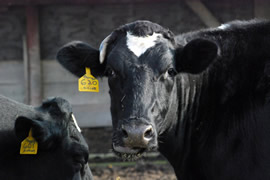Industrial Agriculture vs. Organic Farming:
Better Living through Chemistry?
By Joshua Coates

Another example of misused farmland is exposed by Andre Leu in his article "Organic Agriculture Can Feed the World," in which he informs us that “South American rainforests are cleared for pasture that is grazed with beef destined for the hamburger chains of North America. Once the soil is depleted, new areas are cleared for pasture and old, degraded areas are abandoned to weeds. In Asia, most of the forests are cleared for timber that is exported to the developed industrial economies. One of the saddest things about this massive, wasteful destruction of biodiversity is that very little of the newly cleared land is used to feed the poor. Most of this production of timber and beef is exported to the world's richest economies.”

When you bite into a juicy fast-food specialty burger, you are eating flesh of an animal that was slaughtered on another continent thousands of miles away. This is a far cry from food that is fresh. Once again, we see that industrial agriculture is destroying land-- not making better use of it, as they claim, but rather making a larger profit from it, regardless of the impact. Industrial companies continually insist that their methods are superior because no matter the other costs, they have consistently higher yields.
Although industrial farms may yield more, that is only because “yield can be defined as the production per unit of a single crop.” Since industrial farms plant huge monocultures, they have a high yield of that one particular crop that is the only crop grown on thousands of acres. Output, however, describes total output per unit of area for all the crops on the farm. Viewed this way, small organic farms are 10 to 100 times more efficient, since they use space more efficiently and produce many varieties of crops. So while a large industrial farm may very well produce more corn per acre, a small organic farm produces much more FOOD per acre.
In addition, it should be noted that organic farmers have, in response, recently focused on producing higher yields as well as output so that they can compete against these agribusiness giants on their own terms. Leu writes that “low-tech, sustainable agriculture is increasing crop yields on poor farms across the world, often by 70 percent or more. This has been achieved by replacing synthetic chemicals with natural pest control and natural fertilizers.” Even in the high yield numbers game, it seems organic farming may be gaining the competitive edge.

As for human diseases, industrial agriculture promises us new, genetically modified strains of crops that will be micro-enhanced with the nutrients that are deficient in hunger-stricken parts of the world. In his article, “Benefits of Genetically Modified Crops for the Poor: Household Income, Nutrition, and Health,” Matin Qaim discusses the pending technology of nutrient enriched Golden Rice. Golden Rice is GM rice enhanced with beta carotene which supplies vitamin A. Around the world, vitamin A Deficiency (VAD) kills nearly 3 million children a year. Though the product is not yet available, there are high hopes of it curing this epidemic. This is just the beginning, claims Qaim: “[Bioengineered] crops…hold significant potential to poverty reduction, better nutrition and health, and sustainable development.” But is it too good to be true?
In her article, “Food Safety Battle: Organic Vs. Biotech” Kathy Koch asserts that “within 10 years, experts predict, an estimated 95 percent of America's plant-derived foods will be genetically engineered.” As it is, nearly 60 percent of all processed food already contains GM ingredients, although the packaging does not divulge this. Koch goes on to testify that “this year, an estimated 65 million acres worldwide were planted with transgenic [genetically modified] seeds, including about a third of this year's U.S. corn and soy crops.”

Although they admit to some problems with first generation GM crops, multinational biotechnological companies like DuPont and Monsanto feel confident that the future of industrialized and genetically enhanced second generation super-crops will eradicate illness as well as hunger. Not only are crops being modified to have specific nutrients engineered into their genetic structure, but crops are also being modified to possess other properties in addition to being food. According to Leu, “the latest push in GMO development is BioPharm, in which plants such as corn, sugarcane and tobacco are modified to produce new compounds such as hormones, vaccines, plastics, polymers and other non-food compounds.”
In her article, “Ten Reasons Why Biotechnology Will Be Important to the Developing World” Martina McGloughlin extols the virtues of genetic engineering, saying that “edible vaccines, delivered in locally grown crops, could do more to eliminate disease than the Red Cross.” This is an optimistic view, and one worth considering. However, according to Miguel A. Altieri and Peter Rosset, in their article “Why Biotechnology will not Help the Developing World: A Response to McGloughlin,” even these hopeful promises of edible vaccine crops are dubious. They explain that “scientists have only just begun to scratch the surface of edible vaccine development, which is many years off in practical terms, and presents a number of serious known and unknown health risks.”
The risks of pesticides however, have been known for some time. According to Mary Cooper, in her article “Do Americans Need More Protection from Toxic Chemicals?” pesticides have numerous inherent risks. “Wildlife, laboratory animal, and human studies reveal that as a result of exposure in the womb of mammals including humans, or the eggs of birds, fish and reptiles, to chemicals of this nature, the endocrine, immune, and nervous systems of embryos do not develop normally.”
Did you like the article? Subscribe here to our New Article Email Alert or RSS feeds.
Sharing is caring! Don't forget to share the love, and keep the conversation going by leaving a comment below:
Advertisement
